Tlamelo M Mothudi and Esteri Msindo report on public participation in Parliament and the Provincial Legislature during the Covid-19 lockdown.
Public participation is the bedrock of our Democracy. It has the potential to ensure better decision-making, strengthen accountability and build strong, democratic parliaments. But since the start of the Covid-19 lockdown, legislatures around the country have done little to ensure this.
In April, the presiding officers of Parliament declared there had never been a more important time to boost technological capacity, so the institution could continue to carry out its Constitutional responsibilities. Indeed, Section 118 (1) of the Constitution requires that Parliament, in addition to scrutinising and overseeing the Executive, must provide a forum for public consideration of issues and involvement in its legislative and other processes. Parliament announced a schedule of virtual committee meetings to oversee government departments driving Covid-19 measures.
But public access to these continues to be a problem.
Civil Society knocks on the door
In March, the Public Service Accountabiity Monitor (PSAM) wrote asking portfolio committee chairpersons about plans to continue with oversight and public engagement under lockdown. There has been no response to date, although the communication was acknowledged via the Eastern Cape Provincial Legislature’s Twitter platform.
Action on Legislatures, an informal group of civil society organisations, wrote an open letter to the presiding officers of all nine legislatures and Parliament about transparency and engagement during the national state of disaster. The group asked how they would function and made recommendations on working remotely.
The Eastern Cape Provincial Legislature went virtual in the week of 27 April, resuming portfolio committee meetings. The Legislature’s Communications Unit has provided an important link between external stakeholders and the legislature. It shares via email the Legislature’s schedule with various stakeholders and organisations such as PSAM. Under lockdown, the legislature resorted to sharing the calendar via Twitter. But it hasn’t been shared every week, and not everyone can access Twitter.
The Legislature has access to platforms for publishing, live streaming and broadcasting the work of committees. At the time of writing, the Legislature’s YouTube channel had 19 uploads. Of the uploads of committee meetings, four were sittings of Committees during lockdown.
The ECPL’s YouTube channel was set up in 2015; however, it was only this year when forced by the pandemic, that the Legislature started using this medium. Bhisho, the seat of the legislature, is remote and YouTube must be better utilised to take its work to the people.
In May, the Speaker of the Legislature, Helen-Sauls-August, said it would use technology to continue with house sittings, committee meetings and oversight during the pandemic. She confirmed that access to the legislature, through virtual platforms, has been extended to the media, civil society, researchers and citizens.
But while the Legislature has outlined steps to participate in house sittings, to date there has been no guidance on how members of the public can connect to committee meetings. Those able to access them have had to contend with delays in getting links to the virtual meetings and accessing relevant documents, including the agenda, reports and minutes.
Access and participation
The legislature must continue to use digital platforms including YouTube and Facebook to broadcast all virtual committee meetings and house sittings and take urgent steps to assist with making these accessible to members of the public with limited or no internet access. The legislature’s website can be used to publish further documentation of meetings, including information, oversight activities and decisions.
The work of the legislatures must remain transparent and accessible to ensure executive action is aligned with the interests of the public, and that checks and balances are in place during the pandemic. Legislatures should consider how they will invite public participation during this time.
Recommendations
1. Elected representatives should be pushing for access to cheap or free data so the public can continue to engage in the legislatures. For a start, the public should be able to access Parliament’s website and YouTube channels free of charge.
2. At least a week before the committee sits, all changes to the dates and times of the committee meetings must be publicised on the Legislature’s digital platforms.
3. The Legislature must use its partnerships with civil society actors such as the Parliamentary Monitoring Group (PMG) and the PSAM to help share information.
4. All committee meetings must be regularly recorded or live streamed to allow members of the public access. Recordings must immediately be uploaded to the Legislature’s YouTube channel and a notice sent out on Twitter informing the public.
5. The portfolio committees must make relevant documents available to the public before the start of committee meetings. These documents must be uploaded to the Legislature website so they are accessible afterwards too.
For more information contact:
Esteri Msindo: Human Settlements Researcher
Tlamelo Mothudi: Health Researcher
The Public Service Accountability Monitor
School of Journalism and Media Studies, Rhodes University
046 603 8828
071 256 8254
Disclosure statement:
The PSAM receives funding from a European Union-funded project, “Putting People back in Parliament”, led by the Dullah Omar Institute (University of the Western Cape), in collaboration with the Parliamentary Monitoring Group, Public Service Accountability Monitor (Rhodes) and Heinrich Boell Foundation (South Africa).


